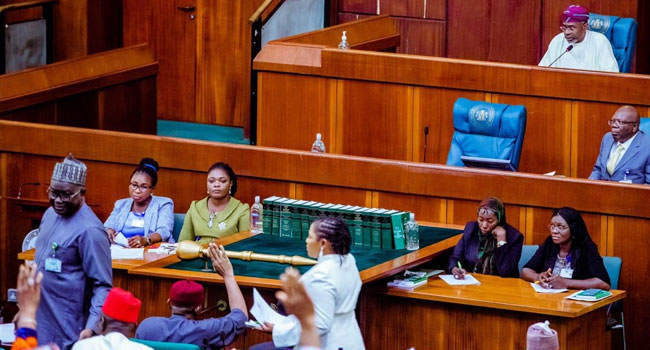Reps To CBN On Cybersecurity Levy “Withdraw Ambiguous Circular”
Described as “ambiguous,” House of Representatives members asked the Central Bank of Nigeria (CBN) to rescind the circular instructing financial institutions to start implementing the 0.5 percent cybersecurity levy on Thursday.
The development followed an urgently needed stop to and modification of the cybersecurity levy proposal made by the honourable Kingsley Chinda.
The Green House says the CBN would “issue a more understandable one” and remove the first circular.
The House had been alerted by Honourable Chinda to several readings of the CBN order that went against the requirements of the Cybersecurity Act.
The House next voiced concern that if quick action was not done to rectify the issues with the way the CBN directive and the Cybersecurity Act were interpreted, the Act will be implemented incorrectly.
On May 6, 2024, the CBN released a circular directing all banks, mobile money operators, and payment service providers to enact a new cybersecurity charge in accordance with the Cybercrime (Prohibition, Prevention, etc.) Amendment Act 2024 (“the Act”).
The Act provides that the Office of the National Security Adviser will oversee the collection and transfer of a tax equal to 0.5 percent of the value of all electronic transactions to the National Cybersecurity Fund (NCF).
The charge must be applied by financial institutions at the time of electronic transfer origination. The financial institution must remit the amount that was subtracted and record it clearly in client accounts under the heading “Cybersecurity Levy.”
Implementation Timeframe: Two weeks after the Circular is issued, financial institutions must begin putting the levy into effect. In other words, financial institutions should start deducting the fee on May 20, 2024. Financial institutions must, however, send their bulk payments to the NCF account held by the CBN by the fifth business day of each month after that.
The circular also sets out the following deadline for financial institutions to reorganise their systems in order to guarantee timely and complete submission of remittance files to Nigeria Interbank Settlement Systems (NIBSS) Plc:
Banks with commercial, merchant, non-interest, and payment service – Four weeks after the circular is issued;
All other Financial Institutions: Eight weeks after the Circular is issued (Microfinance Banks, Primary Mortgage Banks, Development Financial Institutions).
Penalties for Non-Compliance: The CBN has underlined the need of adhering strictly to this directive, cautioning that any financial institution that does not will incur heavy fines. According to the Act, upon conviction, noncompliant entities would be fined at least 2% of their yearly turnover.
Exemptions: To prevent several levy applications, the Circular lists the transactions that are now considered to be exempt. These include salary payments, intra-account transfers both inside and between banks for the same customer, and intra-bank transactions between bank customers.
Other exemptions are orders from other financial institutions to their correspondent banks, interbank placements, bank payments to CBN and vice versa, Transfers between branches of a bank Settlements and clearance of checks Letters of Credit Recapitalization-related funding from banks: only large sums moving from collection accounts savings and deposits, including with long-term investment transactions comprising Treasury Bills, Bonds, and Commercial Papers, transactions involving government social welfare programmes (e.g., pension payments), Transactions involving educational institutions, including tuition payments and other transactions involving schools, universities, or other educational institutions; non-profit and charity transactions, including donations to registered non-profit organisations or charities transactions involving reserve accounts, nostro and vostro accounts, escrow accounts, internal and inter-branch accounts of the bank.
As the new tax will unavoidably raise the cost of conducting business in Nigeria and might affect the increase in the use of digital transactions, stakeholders have responded to its introduction with mixed feelings, according to Andersen Global. Considering the state of the economy today and the government’s pledge to lower taxes in Nigeria under the National Tax Policy of 2017, the implementation of this extra fee may seem out of place even while the government keeps trying to raise income.
To ensure they stay compliant while controlling extra compliance expenses, financial institutions and payment service providers will also need to modify their financial and operational plans to incorporate and account for the new charge. More so, because of concerns on changes in pricing and cost transfer, business owners that mostly depend on digital transactions for obtaining payment may notice a rise in operating costs. Stakeholders and companies should therefore evaluate how this directive may affect their cash flow financially.




